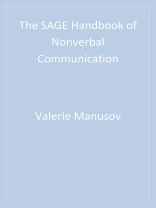This
Handbook provides an up-to-date discussion of the central issues in nonverbal communication and examines the research that informs these issues. Editors Valerie Manusov and Miles Patterson bring together preeminent scholars, from a range of disciplines, to reveal the strength of nonverbal behavior as an integral part of communication.
Key Features:
- Offers a comprehensive overview: This book provides a single resource for learning about this valuable communication system. It is structured into four sections: foundations of nonverbal communication, factors influencing nonverbal communication, functions of nonverbal communication, and important contexts and consequences of nonverbal communication.
- Represents a wide range of expertise and issues: The chapters in this book are written by contributing authors from across disciplines whose work focuses on nonverbal communication. This interdisciplinary volume explores the points of dissention and cohesion in this large body of scholarship.
- Examines the social impact of nonverbal communication: Nonverbal communication is central to socially meaningful outcomes of communication interactions across all relationship types. This volume shows the importance of nonverbal cues to a range of important personal and social concerns and in a variety of social settings.
Innehållsförteckning
Preface – Valerie Manusov and Miles L. Patterson
Introduction: The Ubiquity and Social Meaningfulness of Nonverbal Communiction – Howard Giles and Beth A. Le Poire
Part I: Foundations
1: An Historical Overview of Nonverbal Research – Mark L. Knapp
2: The Evolution of Theories of Interactive Behavior – Miles L. Patterson
3: Methods for the Study of Nonverbal Communication – Heather M. Gray and Nalini Ambady
4: Automatic Cognitive Processes and Nonverbal Communication – Jessica L. Lakin
5: Nonverbal Skills and Abilities – Ronald E. Riggio
6: Nonverbal and Verabl Communication: Hand Gestures and Facial Displays as Part of Language Use in Face-to-Face Dialouge – Janet Beavin Bavelas and Nichole Chovil
Part II: Factors of Influence
7: The Biological Foundations of Social Organization: The Dynamic Emergence of Social Structure Through Nonverbal Communication – Ross Buck and Stacie Renfro Powers
8: An Evolutionary Approach to Understanding Nonverbal Communicaiton – Kory Floyd
9: Personality and Nonverbal Behavior: A Complex Conundrum – Robert Gifford
10: Factoring in Age: Nonverbal Communication Across the Life Span – Roberts S. Feldman and James M. Tyler
11: Women′s and Men′s Nonverbal Communication: Similarities, Differences, Stereotypes, and Origins – Judith A. Hall
12: Culture and Nonverbal Behavior – David Matsumoto
13: Casting Nonverbal Behavior in the Media: Representations and Responses – Valerie Manusov and Adam Jaworski
Part III: Functions
14: Nonverbal Behavior in Intimate Interactions and Intimate Relationships – Peter A. Andersen, Laura K. Guerrero, and Susanne M. Jones
15: Nonverbal Expressions of Dominance and Power in Human Relationships – Judee K. Burgoon and Norah E. Dunbar
16: The Functions of Facial Expressions: What′s in a Face? – Alan J. Fridlund and James A. Russell
17: Why and How the Silent Self Speaks Volumes: Functional Approaches to Nonverbal Impression Management – Caroline F. Keating
18: Nonverbal Communication and Deception – Aldert Vrij
19: The Interaction Management Function of Nonverbal Cues: Theory and Research About Mutual Behavorial Influence in Face-to-Face Settings – Joseph N. Cappella and Darren M. Schreiber
20: Nonverbal Behavior and its Functions in the Ecosystem of Rapport – Linda Tickle-Degnen
Part IV: Contexts and Consequences
21: Nonverbal Cues in Close Relationships – Patricia Noller
22: Nonverbal Communicaiton in Instructional Contexts – James C. Mc Croskey, Virginia P. Richmond, and Linda L. Mc Croskey
23: Nonverbal Communication and Physician-Patient Interaction: Review and New Directions – Jeffrey D. Robinson
24: Nonverbal Dynamics in Computer-Mediated Communication or 🙁 and the Net 🙁 ′s with You, 🙂 and You 🙂 Alone – Joseph B. Wather
25: Nonverbal Communication, Race, and Intergroup Interaction – John F. Dovidio, Michelle Hebl, Jennifer Richeson, and J. Nicole Shelton
26: Uses and Consequences of Nonverbal Communication in the Context of Organizational Life – Martin S. Remland
Part V: Final Thoughts
Nonverbal Communication: Basic Issues and Future Prospects – Miles L. Patterson and Valerie Manusov
Om författaren
Miles Patterson received his Ph.D. from Northwestern University in 1968 and has been at UMSL since 1969. Patterson is the author/editor of 3 books and 85 chapters and articles, mostly on nonverbal communication. His current research interests focus primarily on social behavior in public settings, person perception accuracy, and the role of appearance and nonverbal behavior in forming judgments of others. He was the editor of the Journal of Nonverbal Behavior from 1986-1992 and has been on the editorial boards of several other journals in psychology, communication, and sociology. Patterson is the 2009 recipient of the University of Missouri President′s Award for Research and Creativity and in 1990 was the recipient of the UM-St. Louis Chancellor′s Award for Research and Creativity. He is also a Fellow of both the American Psychological Association and the Association for Psychological Science. Patterson′s teaching interests include social psychology, nonverbal communication, and environmental psychology.












